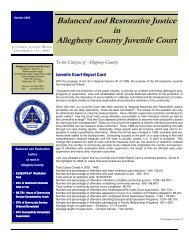News Summary News Summary - Pennsylvania Council of Chief ...
News Summary News Summary - Pennsylvania Council of Chief ...
News Summary News Summary - Pennsylvania Council of Chief ...
Create successful ePaper yourself
Turn your PDF publications into a flip-book with our unique Google optimized e-Paper software.
<strong>News</strong> <strong>Summary</strong><br />
January 22 – February 4, 2011<br />
the treatment they need within the juvenile justice system, thus posing a threat to themselves and<br />
their communities2. Through partnerships with local mental health resources, diversion programs<br />
provide youth with necessary treatment while effectively preventing crime and providing community<br />
safety. Additionally, <strong>Pennsylvania</strong> Act 148 provides fiscal incentives to treat youth close to home,<br />
in their communities, and in the least restrictive environment. Counties with community-based<br />
diversion programs are eligible to receive a state reimbursement <strong>of</strong> up to 80% <strong>of</strong> the cost <strong>of</strong><br />
services whereas counties employing secure detention facilities to treat youth are only eligible for a<br />
state reimbursement <strong>of</strong> up to 50% <strong>of</strong> the cost <strong>of</strong> services3.<br />
Robert Stanzione, President <strong>of</strong> the PA <strong>Council</strong> <strong>of</strong> <strong>Chief</strong> Probation Officers, explains, “Diversion<br />
provides juvenile justice pr<strong>of</strong>essionals with an opportunity to address the criminogenic needs <strong>of</strong><br />
young <strong>of</strong>fenders without compromising community safety. Not all juvenile <strong>of</strong>fenders need to be<br />
exposed to the full resources <strong>of</strong> the juvenile justice system. With careful screening and<br />
assessment, and by engaging community resources, diversion provides young <strong>of</strong>fenders with an<br />
opportunity to redeem themselves in their own community.”<br />
Elton Anglada <strong>of</strong> the Juvenile Defenders Association adds, “The goal <strong>of</strong> <strong>Pennsylvania</strong>’s<br />
Delinquency Courts is to rehabilitate juveniles in need <strong>of</strong> treatment, supervision, and rehabilitation,<br />
and provide these juveniles with the necessary life skills needed to succeed as they move to<br />
adulthood. Diversion programs allow appropriate juveniles to learn from their mistakes without<br />
being subject to the formal process <strong>of</strong> a trial. For many juveniles, a diversion program is sufficient<br />
to put them on the right path.”<br />
George Mosee, Deputy District Attorney in charge <strong>of</strong> Juvenile Diversion in Philadelphia<br />
acknowledged that, “when diversion works properly it ensures that non-violent <strong>of</strong>fenders are<br />
expeditiously held accountable, supervised and effectively treated. Victim restoration can be<br />
accomplished without requiring numerous court appearances. Appropriate charges can be<br />
disposed <strong>of</strong> without burdening the already strained resources <strong>of</strong> our justice system. Rather than<br />
waiting to testify in court, police <strong>of</strong>ficers can spend more time on the streets keeping us safe and<br />
courtrooms can be reserved for only those cases that require the full legal process. Regarding<br />
juveniles with special needs, it benefits everyone when their needs are immediately identified and<br />
they are diverted into an appropriate treatment program as quickly as possible.”<br />
Keith Snyder, Deputy Director <strong>of</strong> the Juvenile Court Judges’ Commission, also notes that, “Juvenile<br />
court records can have significant long-lasting consequences for children. It is critical that<br />
opportunities exist at all stages <strong>of</strong> our system to divert children from formal juvenile court<br />
processing, when appropriate, and to have records expunged consistent with statutory and<br />
procedural rule mandates.”<br />
With the help <strong>of</strong> Models for Change, a national initiative to accelerate reform <strong>of</strong> the juvenile justice<br />
system, counties throughout <strong>Pennsylvania</strong> have begun to implement diversion programs at<br />
different points in the juvenile justice system. In the summer <strong>of</strong> 2009, Allegheny County piloted the<br />
Crisis Intervention Teams for Youth (CIT-Y) curriculum, which trained police <strong>of</strong>ficers in crisis<br />
response techniques designed to address the specific needs <strong>of</strong> youth. On December 1, 2010<br />
mental health experts and law enforcement agents from Allegheny, Bucks, and Cambria Counties<br />
who completed the original 40-hour CIT training convened in Mechanicsburg, PA for a<br />
10








